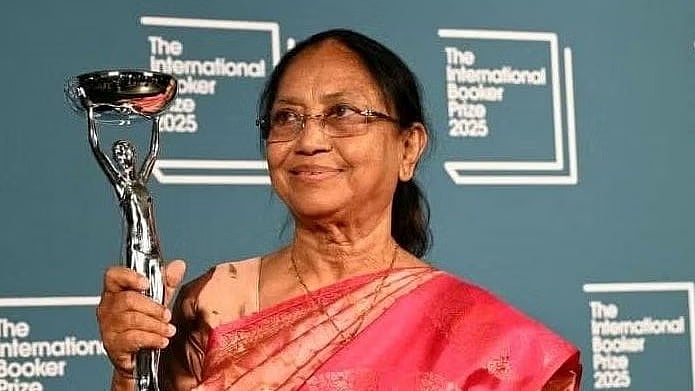
International Booker Prize winner Banu Mushtaq.
Credit: X/@siddaramaiah
“What would happen if one woman told the truth about her life? The world would split open,” wrote American poet Muriel Rukeyser in ‘Kathe Kollwitz’.
To write the truth about women’s lives is a radical act. Banu Mushtaq has done that all her life.
One of the great writers of our time, Mushtaq was born in 1948, and she grew up in a newly independent nation, with a mind of her own. Her progressive Muslim family sent her to college, where she began to write. “Kannada is a language that lets you think without boundaries,” she once said.
A journalist, a lawyer, and the convenor of the Bandaya Sahitya movement, Mushtaq has supported progressive causes. Whether translating legal texts into Kannada, giving talks on social justice, serving as local council member twice, her work has always reflected her commitment to real change.
Yet throughout it all, she has always returned to the written word. Her stories blaze with truth.
Set among Muslim families in southern Karnataka, Heart Lamp — a short story collection which won the International Booker Prize on May 20 — is layered, often ironic, and deeply felt. The short stories centre voices often silenced by gender, class, region, or community: wives, mothers, children, elderly, poor, and marginalised. These characters speak in tones of warmth, humour, despair, and defiance.
In one story, an abandoned wife huddles with her children in the cold. Other women keep vigil in solidarity. One spits furiously: “Is it her fault that she gave birth to three daughters in a row? Is that like making rotis, to roll them out as we want? Thoo!” This scathing indictment of patriarchy was adapted by Girish Kasaravalli into his national award-winning film Haseena.
When a young woman begs to study (“I will wear a burkha and go to college”), her family refuses, and instead gets her married. Social norms bury women under domestic responsibilities. This invisible everyday labour of women is the bedrock upon which society is built. “These children, the home, samsara — do I have even a minute of free time?” asks one woman. “Only God can save us working mothers!” says another, wryly.
Mushtaq writes about motherhood with tenderness and fire. The whisper of an unborn child fills her mother “with an incredible strength that she did not know she had.” Elsewhere, a mother coldly tells her daughter to accept her husband’s betrayal: “He is a man. There is no stain that will stick to him.”
Men can be oblivious. One morning, a man wakes to see the paraphernalia of a night of caregiving: the wet cloth on a sick child’s forehead, the milk bowl overturned, wife and child asleep in exhaustion on the floor. He kicks his wife awake, and walks out of the door.
Deepa Bhasthi’s translation of Heart Lamp is robust, spirited, and filled with exclamations: “Arey!” “Che!”. There are no italics, nor footnotes. A divan cot is a divan cot. Phuppu is Phuppu. A seragu is a seragu. The world is not explained — it is lived.
Within the concrete texture of daily life, there are flashes of the metaphysical. In a tiny village, an ancient tailor challenges an elderly woman: “Do you know, Jamaal Bi, why this whole world, the sun, the moon, the sky and stars have been created?” The grandmother rebukes him: “Philosophy is not your exclusive property.”
Mushtaq’s fiction has powerful moral force. Guilt appears as a relentless hallucination: “Crows screeched in the muttawali saheb’s mind.” A handful of details — cracked heels, colourless skin, Hawaii chappals held together with safety pins — reveal a lifetime of deprivation. A single line shifts a narrative from darkly funny to devastatingly existential. “Was it a Hindu corpse? Was it a Muslim corpse?”
If men debate abstractions, women hold the world together. They ask hard questions and recognise nuance. One woman hesitates to speak: “Why should he tolerate the words of a woman, burkha-clad, of little value?” Nevertheless, the women persist. “Do not beg. Demand justice,” says one to another. One woman even challenges the creator: “Be a woman once, oh Lord!”
Banu Mushtaq’s Booker acceptance speech was a reminder of the value of storytelling: “No story is ever small. In the tapestry of human experience, every thread holds the weight of the whole. In a world that often tries to divide us, literature remains one of the last sacred spaces where we can live inside each other’s minds, if only for a few pages.”
In Mushtaq’s fiction, truth speaks from the margins — with love and courage.
Uma Mahadevan Dasgupta, IAS, is Development Commissioner, Government of Karnataka. X: @readingkafka.
Disclaimer: The views expressed above are the author's own. They do not necessarily reflect the views of DH.